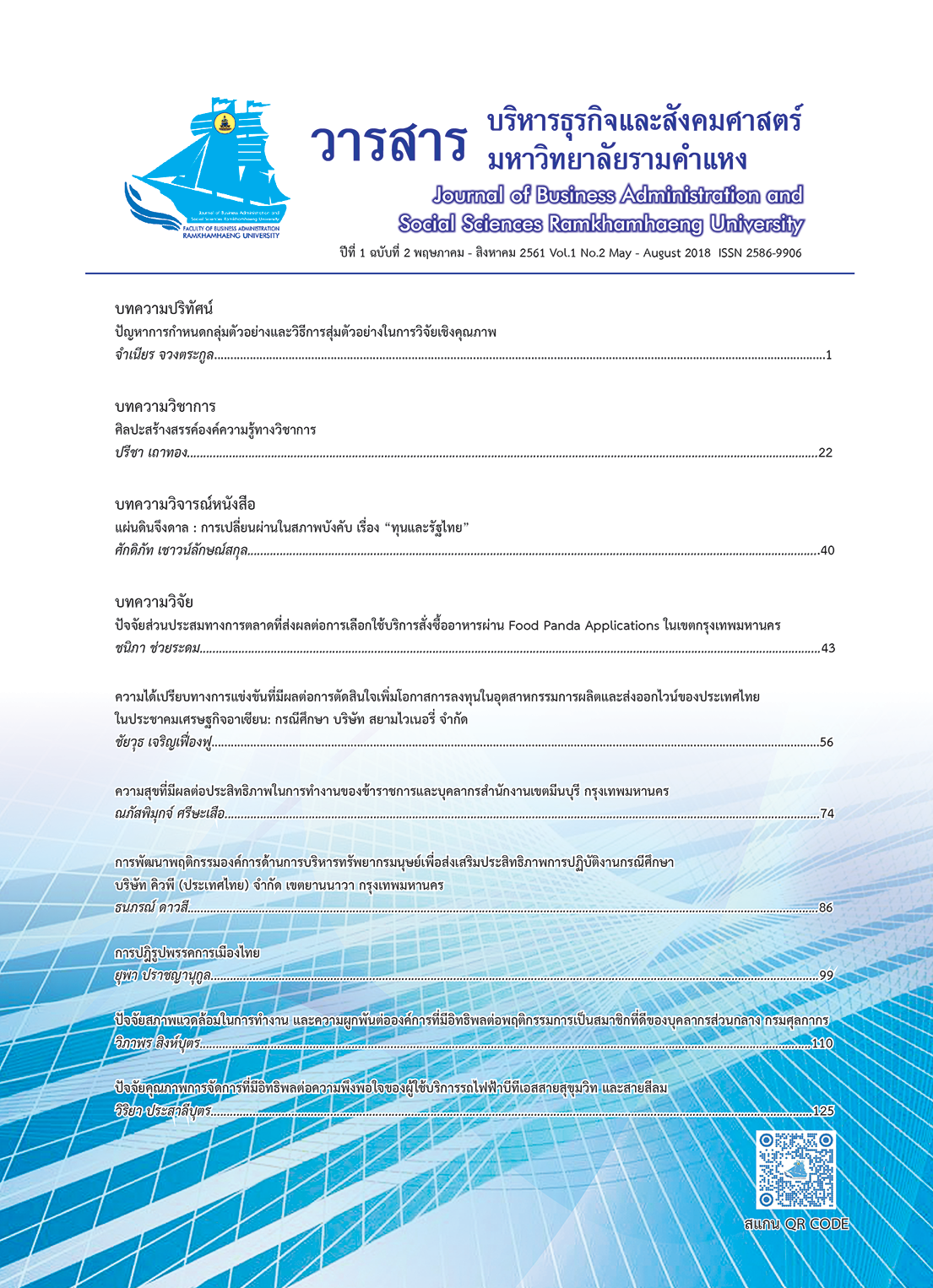WORK ENVIRONMENTAL FACTORS AND ORGANIZATIONAL COMMITMENT INFLUENCING GOOD MEMBERSHIP BEHAVIORS OF CENTRAL PERSONNEL IN CUSTOMS DEPARTMENT
Main Article Content
Abstract
The objective of this research was to study level of Work Environment Organizational Commitment and Citizenship Behaviors of Central Personnel at Customs Department. Include to study and compare level of Citizenship Behaviors of Central Personnel at Customs Department distinguish by Personnel factor and to use this research study to develop work environment and Organizational Commitment in order to improve Citizenship Behaviors of Central Personnel at Customs Department. In this survey is Quantitative research. Participants were 296 populations of Central Personnel at Custom Department. The instrument of research were questionnaires: personal data, work environment, organization commitment and organization citizenship behavior. The statistical methods used for data analysis were frequency, percentage, mean and standard deviation, Scheffe, Pearson’ Product Moment Correlation Coefficient and simple regression. The result showed that level of Work Environment, Organizational Commitment and Citizenship Behavior of Central Personnel at Customs Department were high level. There was difference in the level of Citizenship Behaviors of Central Personnel at Customs Department among personnel who differ in age, educational, work position, monthly income and year of work experience at the statistically significant level of .05. While there was no difference in the level of Citizenship Behaviors of Central Personnel at Customs Department among personnel who classified by sex and status. Hypothesis testing showed that Work Environment can predict influence on the Citizenship Behaviors about 38% at the statistically significant level of .05. Organizational Commitment can predict influence on the Citizenship Behaviors about 38% at the statistically significant level of .05.
Article Details
เนื้อหาและข้อมูลในบทความที่ลงตีพิมพ์ในวารสารบริหารธุรกิจและสังคมศาสตร์ มหาวิทยาลัยรามคำแหง ถือเป็นข้อคิดเห็นและความรับผิดชอบของผู้เขียนบทความโดยตรง ซึ่งกองบรรณาธิการไม่จำเป็นต้องเห็นด้วย หรือร่วมรับผิดชอบใดๆ
บทความ ข้อมูล เนื้อหา รูปภาพ ฯลฯ ที่ได้รับการตีพิมพ์ในวารสารบริหารธุรกิจและสังคมศาสตร์ มหาวิทยาลัยรามคำแหง ถือเป็นลิขสิทธิ์ของวารสารบริหารธุรกิจและสังคมศาสตร์ มหาวิทยาลัยรามคำแหง หากบุคคลหรือหน่วยงานใดต้องการนำบทความทั้งหมดหรือส่วนหนึ่งส่วนใดไปเผยแพร่ต่อ หรือเพื่อกระทำการใดๆ จะต้องได้รับอนุญาตเป็นลายลักษณ์อักษรจากวารสารบริหารธุรกิจและสังคมศาสตร์ มหาวิทยาลัยรามคำแหง ก่อนเท่านั้น
References
กรมศุลกากร. (2559). เป้าหมายขององค์การและขับเคลื่อนเศรษฐกิจของประเทศ. สืบค้นเมื่อ 17 มีนาคม 2560, จาก https://www.custom.go.th
พงษ์ หรดาล. (2540). จิตวิทยาอุตสาหกรรมและองค์การเบื้องต้น. กรุงเทพฯ: ม.ป.ท.
เพียงภัทร์ เจริญพิทยา. (2546). ความสัมพันธ์ระหว่างความผูกพันธ์ต่อองค์การพฤติกรรมการเป็นสมาชิกที่ดี ขององค์การกับผลการปฏิบัติงาน: ศึกษาเฉพากรณีพนักงานในเครือบริษัทสเปเชียลตี้กรุ๊ป จำกัด. (วิทยานิพน์ปริญญามหาบัณฑิต) กรุงเทพ: มหาวิทยาลัยเกษตรศาสตร์.
มนัชยา จันทเขต. (2551) ค่านิยมในการทำงาน ความผูกพันต่อองค์การ ความเชื่ออำนาจในตนกับพฤติกรรมการเป็นสมาชิกที่ดีขององค์การของพนักงานการไฟฟ้าส่วนภูมิภาค (สำนักงานใหญ่). กรุงเทพฯ: มหาวิทยาลัยเกษตรศาสตร์.
เยาวลักษณ์ กุลพานิช. (2533). สภาพแวดล้อมกับประสิทธิภาพของงาน. วารสารข้าราชการ, 35(3), 16-18.
วัลลพ ล้อมตะคุ (2554). การศึกษาปัจจัยเชิงสาเหตุที่ส่งผลต่อพฤติกรรมการเป็นสมาชิกที่ดีขององค์การของพนักงานสายปฏิบัติการมหาวิทยาลัยในกำกับของรัฐ. (วิทยานิพนธ์มหาบัณฑิต สาขาเทคโนโลยีการจัดการ). นครราชสีมา: มหาวิทยาลัยเทคโนโลยีสุรนารี.
สฏายุ ธีระวณิชตระกูล. (2547). แบบจำลองความสัมพันธ์เชิงสาเหตุของพฤติกรรมการเป็นสมาชิกที่ดีต่อองค์การของอาจารย์คณะศึกษาศาสตร์ ในมหาวิทยาลัยของรัฐ. (วิทยานิพนธ์ปริญญาดุษฎีบัณฑิต สาขาการบริหารการศึกษา). ชลบุรี: มหาวิทยาลัยบูรพา.
อาริญา เฮงทวีทรัพย์สิริ. (2558). ความผูกพันต่อองค์การ บุคลิกภาพห้าองค์ประกอบและความสุขในการทำงานของพยาบาล โดยมีพฤติกรรมการเป็นสมาชิกที่ดีขององค์การเป็นตัวแปรสื่อ: กรณีศึกษาโรงพยาบาลมหาวิทยาลัยในกำกับของรัฐแห่งหนึ่ง. (วิทยานิพนธ์ศิลปศาสตรมหาบัณฑิต สาขาวิชาจิตวิทยาอุตสาหกรรมและองค์การ ภาควิชาจิตวิทยา). กรุงเทพฯ: มหาวิทยาลัยธรรมศาสตร์.
Allen, N. J., & Meyer, J. P. (1990). The measurement and antecedents of affective, continuance and normative commitment to the organization. Journal of occupational psychology, 63(1), 1-18.
Bateman, T. S., & Organ, D. W. (1983). Job satisfaction and the good soldier: The relationship between affect and employee “citizenship”. Academy of management Journal, 26(4), 587-595.
Buchanan, B. (1974). Building organizational commitment: The socialization of managers in work organizations. Administrative science quarterly, 533-546.
Gilmer, V. H. B. (1973). Applied Psychology. MxGraw-Hill: New York.
Karambayya, R. (1991). Work Unit Characteristics with Implication for Organization Citizenship Behavior. Unpublished manuscript. York University, North York, Ontario, Canada.
Levy, P. E. (2003). Industrial/Organizational Psychology: Understanding the Workplace. MA: Boston
O’Malley, M. N. (2000). Creating Commitment: How to Attract and Retain Talented Employees by Building Relationships that Last. John Wiley: New York.
Organ, D. W. (1983). Job satisfaction and the good soldier: the relationship between affect and employee citizenship. Academy of Management Journal, 26(4), 587-595.
Organ, D. W., (1987). Organizational Citizenship Behavior. The good soldier syndrome. Massachusetts: Health & Company.
Organ, D. W., Podsakoff, P. M., & MacKenzie, S. B. (2006). Organizational citizenship behavior: Its nature, antecedents, and consequences. Thousand Oaks, CA: Sage.
Organ, D. W., & Ryan, K. (1995). A meta-analytic review of attitudinal and dispositional predictors of organizational citizenship behavior. Personnel Psychology, 48(4), 775 – 802.
Riggio, R. E. (2002). Introduction to Industrial/Organizational Psychology (4th ed.). NJ: Taylor & Francis.
Spector, P. E. (2003). Industrial and Organizational Psychology: Research and Practice (3rd ed.). New York: Wiley.
Yamane, T. (1973). Statistics: An Introductory Analysis (3rd ed.). New York: Harper & Row Publication


